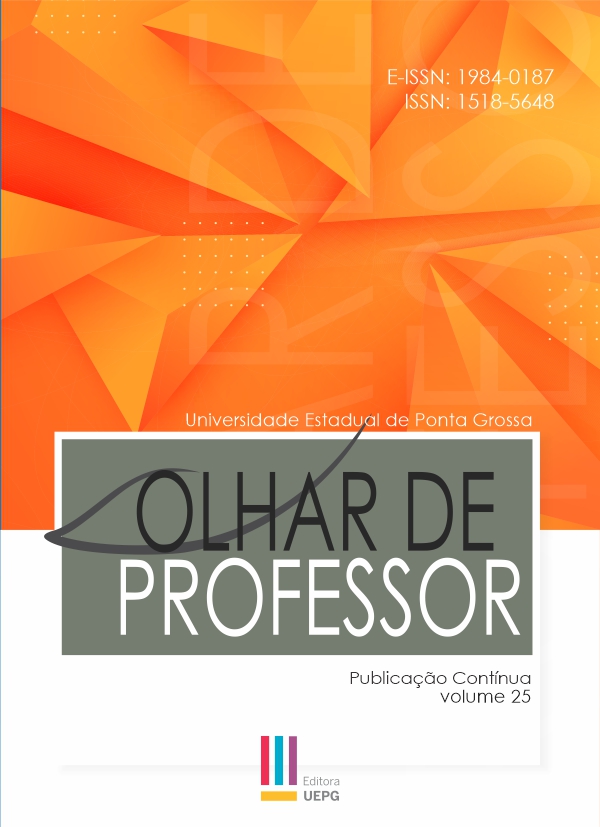The breach of the law on the creation of Federal Institutes and the offering of courses in the “others” category in the IFSP: an attempt to elitize the teaching?
Main Article Content
Abstract
This paper presents a version on higher education in the scenario of the of the Federal Institute of Education, Science and Technology of São Paulo (IFSP), discussing the elitist bias of the trajectory of this level of education in Brazil. Based on the documentary research on the Institutes Creation Law and the Institutional Development Plan (PDI), analyses were made about teacher training beacons (FOR-20) and technical courses (TEC-50). Further, the studies have turned to the Other category, which is not provided for by the Law of Creation of Institutes, but which is strongly present in the modalities of courses offered in the campuses of the IFSP. With a quali-quantitative approach, strong results were obtained that ifsp campuses extrapolate to the maximum percentage established by exclusion. With the documentary analysis made during the research, it was possible to notice that the campuses do not need to offer courses in the Other modality, but rather to fulfill the minimum of 70% of the vacancies for the FOR-20 and TEC-50 beacons provided for by law, emphasizing that the extrapolation of the other category directly impairs the offer of vacancies for the degrees and / or technical courses. With the extrapolation of this modality (Other), a category that prioritizes the implementation of elitist courses, it was possible to portray that elitization is present in the IFSP. Furthermore, it should be noted that the extrapolation of the Other category directly impairs the offer of vacancies for bachelor's and/or technical courses.
Downloads
Article Details

This work is licensed under a Creative Commons Attribution 4.0 International License.
Authors who publish in this journal agree with the following terms:
a) Authors keep the copyrights and concede the right of its first publication to the magazine. The work piece must be simultaneously licensed on the Creative Commons Attribution License which allows the paper sharing, and preserves both the author identity and the right of first publication to this magazine.
b) Authors are authorized to assume additional contracts separately, to not-exclusively distribution of the paper version published in this magazine (e.g.: publish in institutional repository or as a book chapter), with the author identity recognition and its first publication in this magazine.
c) Authors are permitted and stimulated to publish and distribute their papers online (e.g.: in institutional repository or on their personal webpage), considering it can generate productive alterations, as well as increase the impact and the quotations of the published paper.
d) This journal provides public access to all its content, as this allows a greater visibility and reach of published articles and reviews. For more information on this approach, visit the Public Knowledge Project, a project that developed this system to improve the academic and public quality of the research, distributing OJS as well as other software to support the publication system of public access to academic sources.
e) The names and e-mail addresses on this site will be used exclusively for the purposes of the journal and are not available for other purposes.

This work is licensed under a Creative Commons Attribution 4.0 International License.
References
AMORIM, I. F. GONÇALVES, E. R. O papel da disciplina de prática de ensino em cursos de licenciatura: o caso da licenciatura em física do IFSP - campus Votuporanga. 2020. Disponível em: https://cbepf.com.br/cbepf2020/anais/index.php?t=TC2020314997310#. Acesso em: 25 jan. 2021. DOI: https://doi.org/10.22533/at.ed.63021110617
ANDRADE, C. Y. Acesso ao ensino superior no Brasil: equidade e desigualdade social. 2012. Ensino Superior Unicamp. Campinas. Disponível em: https://www.revistaensinosuperior.gr.unicamp.br/artigos/acesso-ao-ensino-superior-no-brasil-equidade-e-desigualdade-social. Acesso em: 26 jan. 2021.
BRASIL. Constituição (1988). Constituição da República Federativa. Disponível em: https://www.senado.leg.br/atividade/const/constituicao-federal.asp. Acesso em: 26 jan. 2021.
BRASIL. Emenda Constitucional nº 95, de 15 de dezembro de 2016. Disponível em: http://www.planalto.gov.br/ccivil_03/constituicao/emendas/emc/emc95.htm. Acesso em: 26 jan. 2021.
BRASIL. Lei de Diretrizes e Bases da Educação Nacional, de dezembro de 1996. Disponível em: http://www.planalto.gov.br/ccivil_03/leis/l9394.htm. Acesso em: 25 jan. 2021.
BRASIL. Lei nº 11.892, de 29 de dezembro de 2008. Disponível em: http://www.planalto.gov.br/ccivil_03/_Ato2007-2010/2008/Lei/L11892.htm. Acesso em: 26 jan. 2021.
CUNHA, Luiz Antônio. A universidade temporã; Da colônia à era Vargas. Rio de Janeiro: Ed. Francisco Alves, 1986.
FILHO, J. M. A "elitização" da universidade pública: um número cada vez maior de estudantes supera condições socioeconômicas que são desfavoráveis. Folha de São Paulo. São Paulo, 3 abr. 1998. Disponível em: https://www1.folha.uol.com.br/fsp/opiniao/fz03049809.htm. Acesso em: 26 jan. 2021.
INSTITUTO FEDERAL DE EDUCAÇÃO, CIÊNCIA E TECNOLOGIA DE SÃO PAULO. Plano de Desenvolvimento Institucional 2019-2023. São Paulo: IFSP, 2019. Disponível em: https://drive.ifsp.edu.br/s/yxtwKgEYfZs4ZCg. Acesso em: 25 jan. 2021.
INSTITUTO NACIONAL DE ESTUDOS E PESQUISAS EDUCACIONAIS ANÍSIO TEIXEIRA. Enade 2018 Resultados e Indicadores. Brasília: Inep, 2018. Disponível em: https://download.inep.gov.br/educacao_superior/enade/apresentacao/2019/apresentacao_coletiva_resultados_enade.pdf. Acesso em: 01 de jan. 2021.
RINESI, E. Universidade reflexiva e cidadania crítica. In: SANTOS, G. (Org.). Universidade, Formação, Cidadania. São Paulo: Cortez, 2001, p. 87-98.
SANTOS, M. G. dos. Universidade contemporânea: elitização e influência do ideário neoliberal. IV Colóquio Internacional: Educação e Contemporaneidade. 2012. São Cristóvão. Disponível em: http://educonse.com.br/2012/eixo_13/PDF/42.pdf. Acesso em: 26 jan. 2021.
SIQUEIRA, A. C. As novas relações entre a universidade e a sociedade brasileira na era da revolução científico-tecnológica: o saber (poder) em disputa. 1995. Anped. Caxambu. Disponível em: http://www.anped11.uerj.br/18/SIQUEIRA.htm. Acesso em: 26 jan. 2021.
ZAGO, N. Do acesso à permanência no ensino superior: percursos de estudantes universitários de camadas populares. Revista Brasileira de Educação. Rio de Janeiro, v. 11, n. 32, p. 226-237. 2006. Disponível em: http://www.scielo.br/scielo.php?script=sci_arttext&pid=S1413-24782006000200003&lng=en&nrm=iso. Acesso em: 26 jan. 2012. DOI: https://doi.org/10.1590/S1413-24782006000200003





